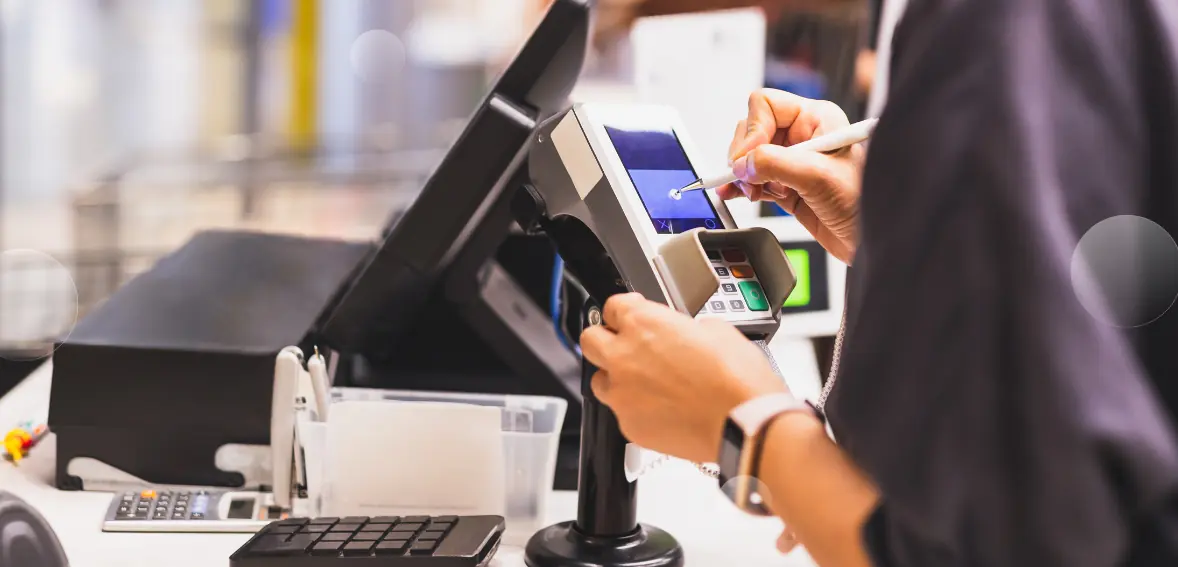You might be wondering about what exactly does the words ‘merchant services provider’ mean. Well, a merchant services provider plays a huge role in operating and growing a particular business. They are a vital partner when it comes to building a successful business.
They provide essential services such as credit card payment processing for a business. Other essential services that a merchant service provider can offer you are:
- Seamless transactions and processing customers’ payments via electronic payments, debit cards, and credit cards.
- Management of PCI compliance standards while storing and processing of payment information of a customer as well as your business.
- Tracking your payments, and business data, and collecting invoices with the help of advanced technology.
Before moving on to learn more about a merchant services provider, you must learn the basics of a merchant. So, without much further ado, let’s start.
What is meant by a Merchant?
Payment processors use the term ‘merchant’ to refer to their customers. These customers or merchants are those business owners who accept debit/credit card payments and other electronic payments from their customers. The transactions may be online, over a mobile phone, or in person.

Also, the merchant payment processors offer software systems and products to run the merchant’s business smoothly. All these services and products are in integration with the business tools.
For example, a payment processor may connect your retail store to a Point of Sale (POS) system. Also, payment processors provide inventory systems, payment reporting, and customer management.
Who is a Merchant?
A merchant is a company or a person that sells services or goods. On the other hand, a person or a company that sells services or goods exclusively online is an eCommerce merchant. The merchants are of two types – retail and wholesale. However, the increase in popularity of online shopping led to the emergence of the third type of merchant – eCommerce merchant. Here are the different merchant types:
- Wholesale Merchant
- Retail Merchant
- eCommerce Merchant
- Affiliate Merchant
Merchant Account – What is it?
A bank account that is specifically established to fulfill business purposes is known as a merchant account. Companies can use this bank account to accept and make payments. The one thing worth noticing is that a merchant account is way different as compared to a simple bank account.

Often this thing is not clear to most business owners. This merchant account allows business owners to accept debit/credit card payments and other electronic payments from their customers by using a payment gateway.
Often, merchant services come both with transaction fees and a variety of services. The transaction fees are charged by the merchant account’s issuing bank, credit/debit card association, and the payment processor.
That’s why a merchant must select a merchant service provider that helps in cutting down the per-transaction fees. However, sometimes, low transaction fees also do not guarantee a reliable service.
Merchant Services – How does it work?
Merchant services providers or companies provide individuals and businesses with software and tools to accept electronic payments and debit/credit card payments.

In the United States, several companies provide merchant services. Leading third-party companies that provide merchant services include Host Merchant Services, PayPal, Stripe, and Square.
On the other hand, big banks such as Wells Fargo, Bank of America, and Chase Bank also operate with merchant services. Whether it is a third-party company or a bank, they offer different services, tools, and fees.
Is it easy to open a Dedicated Merchant Account?
A dedicated merchant account helps establish a financial bond between a business owner and a merchant service provider. This account makes a business eligible for accepting debit/credit card payments and other electronic payments including eCommerce transactions, Apple Pay, Google Pay, and more.
The absence of a merchant account can prove to be risky. It often leads to data breaches and leaks of sensitive credit/debit information. Today, cybercriminals and hackers attack businesses that are not PCI-compliant and steal customers’ data.
To avoid these situations, opening a merchant account is essential. You can easily open a dedicated merchant account with the help of a merchant services provider. The process is simple, secure, and hassle-free.
Merchant Services Tools and Products
What makes a merchant service efficient is its products and the various tools that it offers for payment processing. These products are offered to businesses by merchant service providers. They allow a business to process and accept seamless payment transactions from their customers. Let’s have a look at some of these products and tools.
- Contactless Payments
Payment methods such as debit/credit cards, Android Pay, Apple Pay, Fitbit Pay, Google Pay, and other NFC-enabled devices come under the category of contactless payments. Also, devices that run on Radio-frequency identification technology are used for contactless payments.
- Mobile Payments
When a customer makes a payment transaction for a service or product through a mobile phone or a tablet, the payment method is known as a mobile payment. Also, this technology allows anybody to transfer money to their family members or friends. The applications such as Venmo and PayPal are used for mobile payments.
- Credit/Debit Card Terminals
Credit/Debit Card terminals allow merchants to accept payments through credit or debit cards. It enables a customer to tap, swipe, or dip their payment cards to make their payments. The electronic devices used are also called EDC (Electronic Data Capture Terminal) Terminal.
- eCommerce
When people sell or buy products electronically using online services on the internet, then this activity is known as eCommerce. In the case of eCommerce shopping, debit/credit card payments are accepted online. It can be helpful when offline payment options are not available.
- Virtual Terminals
A software app that allows a merchant to accept credit card payments without any need for the card to be physically present is known as a virtual terminal. This software application allows safe and seamless transactions.
- POS Systems
A POS (full form – Point of Sale) system means when customers make payment transactions for services or products at a store. In other words, when customers purchase goods at your store and make the payment, they are fulfilling a POS transaction.
- Payment Gateways
Payment gateways are software that works with a merchant’s eCommerce store or online website. It allows the merchant’s business to process and accept online credit card transactions.
Typically, payment gateways serve the same way the credit/debit card terminals serve. The only difference is that payment gateways accept online payments whereas card terminals accept offline payments.
Payment Processing
The role of a merchant service provider is to form an intermediary link between your business, customers, and banks. It allows your business and customers to confidently make seamless transactions through various forms of payment methods. The payment processor makes sure that all payments arrive securely in the merchant account.
As soon as the customer swipes their credit card, the merchant payment processor transfers the customer’s money to your merchant account. It typically takes 48 hours to complete the transfer process. Some businesses get the funds faster in their account because they are eligible for the next-day deposit of funds.
A merchant service provider provides a business with mobile swipers and credit/debit card terminals. In the case of online businesses, they integrate the payment gateways with their eCommerce stores.
Also, they provide virtual terminals that help in accepting online payments through mobile phones. Your merchant payment processor will help you in finding your business an efficient payment processing service.
Payment Security
For businesses that process online payments, credit/debit card transactions, and store payment card data, payment security is essential. It is because of the potential risks that are involved while accepting payments.
Hackers and cybercriminals are always in search of vulnerable merchant systems to steal their business and customer data. With payment security in place, you can complete your business transactions securely and safely.
PCI compliance is another big step towards making your business less vulnerable to risks and fraud. You can make your business PCI-compliant with the help of a merchant service provider. PCI compliance makes sure that the customers’ card data including card numbers and names are secure.
Apart from PCI compliance, a merchant services company provides tokenization. Tokenization protects the payment information of the business and customers by implementing preventive measures against fraud. Get more information about how Host Merchant Services protects your payment information.
Technology Provider
A merchant services company provides your business with the latest information and technology. You can use it to optimize the performance of your business. Apart from that, you can get more information about the business payment data that a merchant services company provides. This data may include:
- Which customer is spending more money and time with your business?
- At what time of the day is your business collecting the highest number of payments?
- Can you increase revenue on some services or products?
Important Questions That You Should Ask a Merchant Services Provider Company
- What is the structure of your equipment costs?
- What is the processing cost?
- Is there any other fee or cost?
- Is a contract required?
- What types of statements or reporting do you offer?
- Is your equipment in compliance with PCI DSS?
- What type of merchant service should I choose?
If you want to improve the operations of your business, make your every cent count. That’s why having a reliable merchant services provider is imperative for your business. A proper merchant payment processor will help your business to grow and better serve your customers.
World economies are changing at a rapid pace. That’s why it is essential to provide your customers with a variety of payment options. Payment processing methods such as virtual terminals, contactless payments, and mobile payments help in expanding revenue generation. Also, it gives a seamless experience to your customers.
Getting In Touch with a Merchant Services Provider? Here’s what you should look for
If you are finding a merchant service provider for your business, then keep in mind their costs. Typically, these costs depend upon the types of solutions your business needs. When it comes to charges, keep the following in mind:
- Equipment Fee
- Setup Fee
- Service Fee/Monthly Fee
- Credit Card Processing Fee
- Transaction Fee
- Payment Processing Fee
Flat Rate Processing Fee: It is suitable for startups and small businesses having a volume of low sales. The flat-rate processing fee is fixed that is charged while payment processing.
Interchange-Plus Processing Fee: It is suitable for credit/debit card transactions. The credit card associations such as Visa and MasterCard have their specific rates of interchange fees.
Direct Interchange Processing Fee: It works best for businesses having high volume sales. This fee is charged by merchants as a monthly fee. It does not involve any percentage rate.
Additional Charges to look out for:
- Statement Fee
- Account Fees
- PCI-Compliance Fee
- Minimum Processing Fee
- Cancellation Fee
- Account Setup Fee
- NSF Fee
- Chargeback Fees
Host Merchant Services has been ranked 2020 as one of the top companies in the merchant services industry. Our subscription-based services have disrupted the whole payment processing industry. We provide transparent and reliable merchant services without any contracts, hidden fees, or markups.
Our mission is to keep all the sensitive data of the business owners in their hands. With our advanced technology, software, equipment, and tools, you can securely grow your business. Also, these tools and software allow you to securely accept payments, track transactions, collect invoices, and view detailed business reports.

